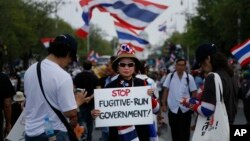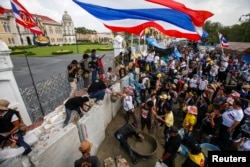BANGKOK —
Thousands of anti-government protesters were back outside the offices of Prime Minister Yingluck Shinawatra on Monday, just days after police had cleared them from the site. The protesters aim to prevent Yingluck from returning to her office, even at risk of a confrontation with police.
Up to 10,000 anti-government protesters reoccupied key roads outside Thai Prime Minister Yingluck Shinawatra's offices in a show of defiance.
On Friday, Thai police with baton shields had marched into the area held by anti-government protesters for several weeks.
Yingluck had hoped to return to her offices Wednesday. But Monday, protest leader Suthep Thaugsuban challenged the government to retake the roadways.
Labor Minister Chalerm Yubamrung, who heads the government security operations center overseeing implementation of an emergency decree, has vowed to clear all the protest sites within days.
A protester, Sukpan, said the people are still calling for Yingluck's resignation. "The situation; many people want to tell Yingluck to get out. It is not fair for people. Chalerm, he speech you cannot trust. Not sincere, he tell a lie. Yes, I do not know how long, but at the end the people will win," Sukpan stated.
The government set a general election February 2 in a bid to ease political tensions. But the results are inconclusive because of an election boycott by the opposition Democrat Party and anti-government protests, which prevented the registration of candidates in 28 constituencies, largely in the south.
The Election Commission and government ministers tried unsuccessfully on Monday to set a new date for voting in those constituencies and other areas where voting was disrupted.
Residents of the northern provinces, who largely support YIngluck, have been hurt by the government's inability to pay thousands of rice farmers under a price support program. The government is trying to sell up to 20 million tons of rice amid slow international sales. Analysts said the program could cost the economy as much as $19 billion.
Thousands of farmers have traveled to Bangkok in a campaign to be paid some of the $4.2 billion owed.
Adding to the government's problems, analysts said economic growth in the last quarter of 2013 was under one percent. The World Bank is warning the anti-government protests will impact investment, tourism and public spending in 2014.
Protester and chauffeur Benjob Chantes said problems faced by Yingluck's administration are increasing and if another election was held now it could bring a change in government. "Yes, I am sure we are winning. The government has nothing to do just now. It is a deadlock for election," said Chantes.
The anti-government People's Democratic Reform Council charges Yingluck is a proxy for her older brother -- former prime minister Thaksin Shinawatra, who fled Thailand in 2008 to escape a two-year jail term for corruption.
The protests began in November after Yingluck's governing Pheu Thai Party passed legislation giving a blanket amnesty to Thaksin and other Cabinet members. The Thai Senate anulled the bill, but the rallies continued.
Up to 10,000 anti-government protesters reoccupied key roads outside Thai Prime Minister Yingluck Shinawatra's offices in a show of defiance.
On Friday, Thai police with baton shields had marched into the area held by anti-government protesters for several weeks.
Yingluck had hoped to return to her offices Wednesday. But Monday, protest leader Suthep Thaugsuban challenged the government to retake the roadways.
Labor Minister Chalerm Yubamrung, who heads the government security operations center overseeing implementation of an emergency decree, has vowed to clear all the protest sites within days.
A protester, Sukpan, said the people are still calling for Yingluck's resignation. "The situation; many people want to tell Yingluck to get out. It is not fair for people. Chalerm, he speech you cannot trust. Not sincere, he tell a lie. Yes, I do not know how long, but at the end the people will win," Sukpan stated.
The government set a general election February 2 in a bid to ease political tensions. But the results are inconclusive because of an election boycott by the opposition Democrat Party and anti-government protests, which prevented the registration of candidates in 28 constituencies, largely in the south.
The Election Commission and government ministers tried unsuccessfully on Monday to set a new date for voting in those constituencies and other areas where voting was disrupted.
Residents of the northern provinces, who largely support YIngluck, have been hurt by the government's inability to pay thousands of rice farmers under a price support program. The government is trying to sell up to 20 million tons of rice amid slow international sales. Analysts said the program could cost the economy as much as $19 billion.
Thousands of farmers have traveled to Bangkok in a campaign to be paid some of the $4.2 billion owed.
Adding to the government's problems, analysts said economic growth in the last quarter of 2013 was under one percent. The World Bank is warning the anti-government protests will impact investment, tourism and public spending in 2014.
Protester and chauffeur Benjob Chantes said problems faced by Yingluck's administration are increasing and if another election was held now it could bring a change in government. "Yes, I am sure we are winning. The government has nothing to do just now. It is a deadlock for election," said Chantes.
The anti-government People's Democratic Reform Council charges Yingluck is a proxy for her older brother -- former prime minister Thaksin Shinawatra, who fled Thailand in 2008 to escape a two-year jail term for corruption.
The protests began in November after Yingluck's governing Pheu Thai Party passed legislation giving a blanket amnesty to Thaksin and other Cabinet members. The Thai Senate anulled the bill, but the rallies continued.





